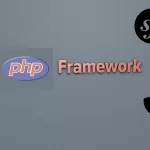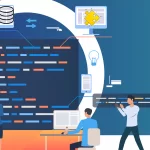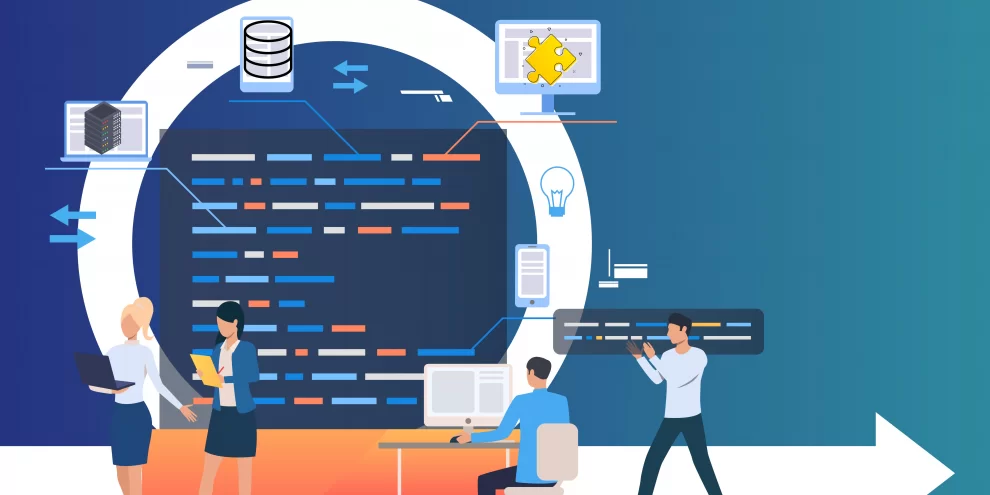Welcome to the dynamic realm of software development, where innovation and creativity converge to shape the digital landscape. As technology advances and user expectations rise, the need for skilled professionals in backend development becomes increasingly crucial. In this guide, we will navigate through the fundamental steps and strategies to become a proficient backend developer, exploring the essential backend developer skills and roadmap needed to excel in this exciting career path.
The backend of any software application is like the engine of a car. It powers the functionalities, processes data, and ensures a seamless user experience. Backend developers are the architects behind the scenes, designing, implementing, and maintaining the server, databases, and application logic. Their role is to build the backbone that supports the application’s frontend and user interactions.
Throughout this guide, we will unravel the skills and knowledge essential to embark on this rewarding journey. Whether you’re a budding developer looking to specialize or a seasoned professional seeking to expand your expertise, understanding the backend developer skills and roadmap is the first step towards mastering the art of backend development. So, let’s dive in and explore the path that will lead you to become a proficient backend developer.
Understanding Backend Development
Backend development forms the backbone of any software or web application. It encompasses the server-side operations and functionalities that power the frontend, enabling a seamless and functional user experience. In simple terms, while the frontend focuses on what users see and interact with, the backend deals with the underlying processes that make it all work.
The Core Components of Backend Development:
Server:
The server is the heart of the backend. It manages requests from clients, processes data, and ensures smooth communication between the database and the user interface.Database:
Databases are where all the application’s data is stored. This includes user information, content, configurations, and more. Backend developers design, implement, and optimize database structures to ensure efficient data management and retrieval.Application Logic:
The application logic consists of the algorithms and computational procedures that govern how the application operates. It involves data processing, user authentication, and business rules implementation.
Functions and Responsibilities of Backend Developers:
API Development:
Backend developers design and build APIs (Application Programming Interfaces) that allow different software components to communicate with each other. APIs are crucial for enabling integration between various systems and services.Security Implementation:
Backend developers are responsible for implementing security measures to protect data and prevent unauthorized access. This includes encryption, authentication, and secure coding practices.Performance Optimization:
Optimizing the performance of the application is key. Backend developers work on enhancing the speed and responsiveness of the application by optimizing code, databases, and server configurations.Scalability:
As applications grow, they need to handle increased traffic and data. Backend developers design the application’s architecture to ensure it can scale efficiently, accommodating higher loads without compromising performance.
In summary, backend development involves creating and maintaining the server, databases, and application logic that power the software. It’s about ensuring the application functions smoothly, securely, and efficiently, meeting both user needs and business requirements. A solid understanding of backend developer skills and roadmap is essential for anyone aspiring to excel in this field.
Also Read: Top Backend Project Ideas for Your Portfolio (guide for US developers)
Importance of Backend Development
Backend development is the backbone of the digital world we live in today. While the frontend provides the interface and the visual experience, the backend is what powers the functionality, data management, and overall performance of web and mobile applications. Understanding the importance of backend development is crucial for anyone aspiring to become a proficient developer.
Data Management and Storage:
Backend development involves designing and managing databases, ensuring data is stored, organized, and accessible. Data is a cornerstone of any application, and the backend ensures efficient handling, retrieval, and storage of this critical asset.Security and Authorization:
Securing sensitive information and ensuring only authorized users can access it is a paramount concern. Backend developers implement robust security measures to protect data from unauthorized access, ensuring the safety and privacy of users.Seamless Functionality:
The backend is responsible for the smooth functioning of the application. It handles the application’s logic, algorithms, and calculations that enable functionalities like form submissions, data processing, and integrations. A well-designed backend guarantees a seamless user experience.Scalability and Performance:
As applications gain users and data, they need to scale to meet increased demand. Backend developers create scalable architectures that can handle more traffic and data, ensuring the application’s performance remains optimal even as it grows.Integration and Interoperability:
In today’s tech ecosystem, applications often need to communicate with each other. Backend development facilitates integration by creating APIs that allow different applications or services to interact, share data, and work together cohesively.Enhanced User Experience:
The backend plays a vital role in ensuring a positive user experience. Fast load times, seamless interactions, and reliable performance—all made possible through efficient backend development—enhance user satisfaction and engagement.
In conclusion, backend development is the engine that drives the entire digital experience. Without a well-structured, efficient backend, even the most beautiful and well-designed frontends would lack the necessary functionality and reliability. To excel in the field of backend development, one must invest time and effort into mastering the essential backend developer skills and roadmap. It’s not just about code; it’s about creating a strong foundation for the digital world to thrive upon.
Essential Backend Developer Skills
Becoming a proficient backend developer demands a specific set of skills that are essential for creating robust, efficient, and secure applications. Here are the fundamental skills that should be a part of any aspiring backend developer’s toolkit.
Programming Languages:
A strong grasp of programming languages is foundational for backend development. Key languages include:
Python:
Known for its readability and versatility, Python is extensively used in backend development for its vast array of libraries and frameworks.Java:
A widely adopted language, particularly in enterprise-level applications due to its platform independence and scalability.JavaScript (Node.js):
Node.js allows backend development with JavaScript, offering high performance and a vast ecosystem of packages.Ruby:
Known for its simplicity and productivity, Ruby, along with the Ruby on Rails framework, is popular for web application development.
Database Management:
Understanding how to design, implement, and manage databases is crucial. Backend developers should be proficient in both SQL (e.g., MySQL, PostgreSQL) and NoSQL (e.g., MongoDB, Cassandra) databases, as each serves specific purposes and use cases.
Server and Application Management:
Backend developers need to be adept at managing servers and deploying applications. Familiarity with server technologies like Apache, Nginx, and cloud platforms such as AWS, Azure, or Google Cloud is vital.
APIs and Web Services:
Creating robust APIs (Application Programming Interfaces) is essential for backend development. APIs facilitate communication between different systems, enabling seamless data exchange. Understanding RESTful principles and GraphQL is crucial in modern web development.
Version Control Systems:
Proficiency in version control systems like Git is a must. It allows developers to collaborate effectively, track changes, and manage different versions of the codebase.
Understanding of Frontend Technologies:
While specializing in backend development, having a good understanding of frontend technologies (HTML, CSS, JavaScript) is beneficial. This knowledge facilitates effective collaboration with frontend developers and helps in understanding the overall application architecture.
Understanding of Software Architecture:
Knowledge of software architecture patterns (e.g., MVC, MVVM) is important for creating scalable, maintainable, and modular code.
Problem-Solving and Logic:
Being able to analyze complex problems and design efficient solutions is a hallmark of a good backend developer. Strong analytical and logical thinking skills are vital.
Security Best Practices:
Understanding and implementing security best practices to protect data and prevent unauthorized access is critical. Knowledge of encryption, authentication mechanisms, and secure coding practices is a must.
Testing and Debugging:
Backend developers need to be proficient in testing their code and debugging efficiently. Understanding different testing frameworks and methodologies is crucial for delivering high-quality, error-free applications.
In summary, acquiring these backend developer skills and roadmap is essential for anyone aspiring to excel in backend development. Continuous learning, staying updated with industry trends, and practical application of these skills will contribute to becoming a successful backend developer.
Also Read: Backend Developer Skills You Should Know
Building Your Backend Developer Roadmap
Building a solid roadmap is crucial for aspiring backend developers. It provides a clear direction and milestones to achieve as you progress in your journey. Here’s a structured approach to construct your personalized roadmap in mastering backend developer skills and roadmap.
Set Clear Goals:
Define your specific objectives and goals. Do you want to specialize in a particular programming language, become an expert in database management, or focus on creating robust APIs? Having clear goals helps you tailor your learning path.Understand the Fundamentals:
Start with a strong foundation in programming languages, databases, and server management. Learn the basics of key languages like Python, Java, or JavaScript (Node.js) and grasp fundamental database concepts.Select a Language and Framework:
Choose a programming language and its associated framework to specialize in. Python with Django, or Node.js with Express.js are popular combinations. Delve deep into the chosen language and framework to understand its advanced features.Master Database Management:
Dive into advanced database management concepts and practices. Understand how to design efficient database structures, optimize queries, and ensure data security. Explore both SQL and NoSQL databases.Learn API Development:
Focus on mastering API development. Understand RESTful principles and learn how to design efficient, scalable APIs. Practice creating APIs for different use cases to enhance your skills.
Gaining Practical Experience
Acquiring practical experience is a pivotal step in becoming a proficient backend developer. It not only validates your knowledge but also hones your skills in a real-world setting. Here are some effective strategies to gain practical experience in backend development and solidify your backend developer skills and roadmap.
Internships and Entry-Level Positions:
Consider applying for internships or entry-level positions in companies specializing in backend development. These roles provide hands-on experience, expose you to industry practices, and allow you to work alongside seasoned professionals.Freelancing and Personal Projects:
Engage in freelancing opportunities or work on personal projects. Offer your services to local businesses or non-profit organizations. Building applications for real clients enhances your project management skills and helps you understand clients’ needs and expectations.Open-Source Contributions:
Contribute to open-source projects related to backend development. Platforms like GitHub offer a plethora of open-source projects where you can collaborate, contribute, and learn from experienced developers. It’s a great way to enhance your coding skills and gain exposure to different codebases.Participate in Hackathons and Coding Competitions:
Join hackathons or coding competitions that focus on backend development challenges. These events provide a platform to test your skills in a time-bound, high-pressure environment. Additionally, they expose you to innovative solutions and broaden your problem-solving abilities.Collaborate with Peers:
Work on collaborative projects with peers or fellow developers. Collaborations expose you to different working styles, encourage knowledge sharing, and present diverse problem-solving approaches. They also teach you effective teamwork and communication, essential aspects of professional development.
Networking and Professional Growth
Networking and continuous professional growth are essential components of a successful backend development career. Building strong connections within the industry and constantly expanding your knowledge are key aspects of the backend developer skills and roadmap. Let’s explore how you can effectively network and grow professionally in the field of backend development.
Attend Conferences and Meetups:
Participate in backend development conferences, seminars, and meetups in your area or virtually. These events provide valuable opportunities to connect with industry experts, learn about the latest trends, and gain insights into emerging technologies.Engage in Online Communities:
Join online communities, forums, and social media groups dedicated to backend development. Active participation allows you to exchange ideas, seek advice, and stay updated with the latest news and advancements in the field.Utilize Professional Networking Platforms:
Leverage platforms like LinkedIn to connect with professionals in your industry. Showcase your skills, share articles, and engage in relevant discussions to expand your network and visibility.Contribute to Industry Publications:
Write articles or blog posts on backend development topics. Sharing your knowledge and experiences through industry publications establishes you as an authority in your field and attracts connections within the community.Collaborate on Open-Source Projects:
Collaborate on open-source projects related to backend development. Working alongside other developers not only enhances your skills but also exposes you to a broader network of professionals.Seek Mentorship:
Find a mentor who can provide guidance and advice in your backend development journey. A mentor can help you navigate challenges, offer insights, and provide a roadmap for your professional growth.
Conclusion
Embarking on the journey to become a proficient backend developer is an exciting and rewarding endeavor. The realm of backend development is a vital part of the digital landscape, powering the functionalities and unseen mechanics that make applications work seamlessly. This comprehensive guide has shed light on the essential backend developer skills and roadmap necessary to thrive in this dynamic field.
We began by understanding the core concepts of backend development, highlighting its importance in the realm of software and web development. The backend serves as the foundation upon which applications are built, managing data, ensuring security, and delivering a seamless user experience. Aspiring backend developers need to master a set of fundamental skills to excel in this field.
The journey involves honing programming languages, database management, server and application handling, API development, and understanding frontend technologies. Acquiring these skills forms the foundation for a successful backend development career. Educational paths, projects, and practical experiences are stepping stones that lead to becoming a proficient backend developer.















